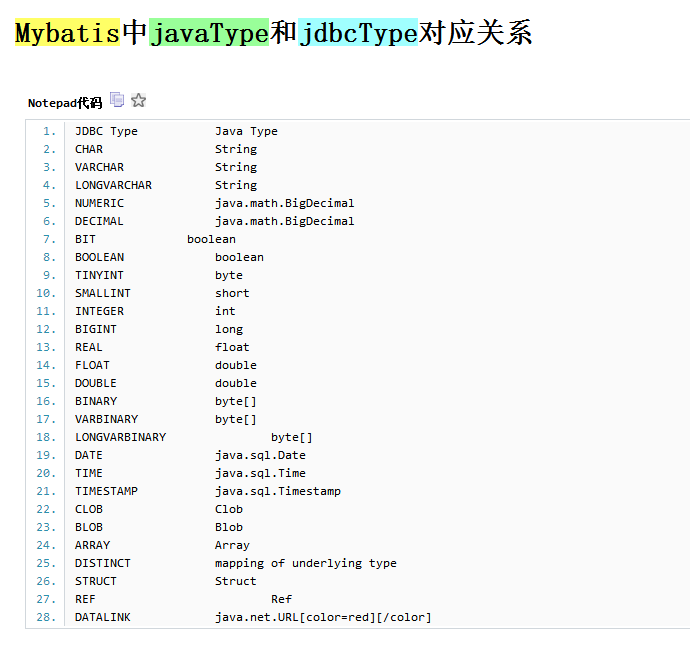
1、新增时获得主键
<insert ...>
<selectKey resultType="java.lang.Integer" keyProperty="id" order="AFTER">
SELECT LAST_INSERT_ID()
</selectKey>
INSERT INTO ...
</insert>
或
<insert id="insert" parameterType="com.test.User" keyProperty="id" useGeneratedKeys="true" >
INSERT INTO ...
</insert>
2、Boolean判断
<if test="isReturnReport !=null and isReturnReport.toString() == 'true'.toString()">
...
</if>
3、大于、小于符号转义
& &
" "
' '
大于号: > > 或 <![CDATA[ > ]]>
小于号: < < 或 <![CDATA[ < ]]>
eg.
AND DATE_FORMAT(create_date,'%Y-%m-%d') >= #{beginDate, jdbcType=VARCHAR}
AND DATE_FORMAT(create_date,'%Y-%m-%d') <![CDATA[ >= ]]> #{beginDate, jdbcType=VARCHAR}
4、参数为逗号隔开的字符串
FIND_IN_SET(field,param)函数:
AND FIND_IN_SET(user_id,#{_parameter})
_parameter:
获取传入的原参数值,不作预编译处理
5、模糊查询
AND settle_name LIKE CONCAT('%',#{settleName,jdbcType=VARCHAR},'%')
6、级联查询
一对多查询:
一中的xml:
<collection property="optionsList"
column="id"
ofType="com.hs.qmct.app.web.model.question.QuestionOptions"
select="com.hs.qmct.app.web.dao.question.QuestionOptionsMapper.selectByQuestionId">
</collection>
多中的dao:
List<QuestionOptions> selectByQuestionId(Integer questionId);
传递多个参数时:
一中的xml:
column= "{prop1=col1,prop2=col2}"
多中的xml:
<select parameterType="java.util.Map" ....>
select .... where val1=prop1 and val2=prop2
</select>
多对一查询:
一中的xml:
<association property="district"
column="receive_district_id"
javaType="com.hs.qmct.app.web.model.district.District"
select="com.hs.qmct.app.web.dao.district.DistrictMapper.selectByPrimaryKey">
</association>
另一个一中的dao:
District selectByPrimaryKey(Integer id);
7、传参占位符#{}和${}的区别
#{} 具有预编译效果,一般作为条件传参时使用,可防止sql注入
${} 不具有预编译效果,一般在排序中会用到,偶尔也会作为条件传参
eg1.
SELECT id from tables where id=#{id} 解析为:SELECT id from tables where id=?
SELECT id from tables where id='${id}' 解析为:SELECT id from tables where id=原参数值
eg2.
ORDER BY ${param} 此时param是一个列名
ORDER BY #{_parameter} 此时传入的参数有且仅为一个列名
8、批量新增使用forEach
int batchInsert(List<Event> records);
<!--批量新增事件-->
<insert id="batchInsert">
insert into
hserp_sys_event(id, event_name_parent, event_name,event_desc, class_path, interface_path,create_by, create_date)
values
<foreach item="item" index="index" collection="list" separator=",">
(#{item.id}, #{item.eventNameParent}, #{item.eventName},
#{item.eventDesc}, #{item.classPath}, #{item.interfacePath},
#{item.createBy}, sysdate())
</foreach>
on DUPLICATE key update last_update_date = sysdate()
</insert>
传参主要有一下3种情况:
1. 如果传入的是单参数且参数类型是一个List的时候,collection属性值为list
2. 如果传入的是单参数且参数类型是一个array数组的时候,collection的属性值为array
3. 如果传入的参数是多个的时候,我们就需要把它们封装成一个Map了
9、解决int类型返回报错
IFNULL(MAX(SORT),0)
10、一次执行多条sql
需要在xml中加入
<property name="url" value="jdbc:mysql://localhost:3306/how2java?characterEncoding=UTF-8&allowMultiQueries=true"/>
或在配置文件中加入
hikariConfig.security.jdbcUrl=jdbc:mysql://xx.xx.xx:3306/xxxxx?characterEncoding=utf-8&autoReconnect=true&failOverReadOnly=false&allowMultiQueries=true